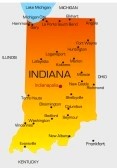Indiana Supreme Court Rules PCF Cannot Contest Liability
 On Oct. 31, the Indiana Supreme Court unanimously ruled that the state’s Patient Compensation Fund (PCF)—established to cover excess damages in medical malpractice cases—may not dispute the existence or cause of a plaintiff’s injury in a case in which the medical providers previously settled the claim, admitting liability. The decision, Robertson v. B.O., has led to much excitement among the plaintiff’s bar.
On Oct. 31, the Indiana Supreme Court unanimously ruled that the state’s Patient Compensation Fund (PCF)—established to cover excess damages in medical malpractice cases—may not dispute the existence or cause of a plaintiff’s injury in a case in which the medical providers previously settled the claim, admitting liability. The decision, Robertson v. B.O., has led to much excitement among the plaintiff’s bar.
In accordance with the Indiana Medical Malpractice Act, a plaintiff in a medical malpractice action can only recover $1.25 million in total damages. The negligent healthcare worker pays the first $250,000, and the Indiana PCF pays the next $1 million.
At the heart of this case was the question: When defending against a petition to recover excess damages that arise from a medical malpractice action where the healthcare provider has admitted liability, may the Indiana Patient’s Compensation Fund present evidence to dispute the existence or cause of the plaintiff’s injury?
In Robertson v. B.O., the plaintiff was diagnosed with spastic diplagia, the most common type of cerebral palsy, which occurs when the brain’s cerebral cortex is damaged, at age four. The plaintiff’s parents filed a medical malpractice lawsuit claiming medical negligence at the time of B.O.’s birth. The day prior to the malpractice trial, the two parties settled.
In most situations, this would have been the end of the case, but the Indiana PCF wanted to dispute the facts of the case that lead to the settlement. The PCF claimed that it had expert witnesses willing to testify that B.O. either did not have spastic diplagia or that the spastic diplagia was not due to medical negligence.
The plaintiff attorney immediately filed a motion that this expert testimony could not be made after the fact. The trial judge agreed. The PCF appealed the decision, and the Court of Appeals agreed with the PCF. B.O. appealed that ruling to the Indiana Supreme Court.
The Indiana Supreme Court would only address whether liability had been established. Because the definition of liability was not spelled out in the Indiana Medical Malpractice Act, the high court would turn to common law in order to define liability.
Under these conditions, the Indiana Supreme Court found that the finding of liability against the physician contained in the settlement provided a determination of an injury to the plaintiff. Further, while unfair that the PCF is bound by something determined n a settlement rather than a trial, the Indiana Medical Malpractice Act was drafted to permit unfairness because:
“In an effort to control the costs associated with medical malpractice claims, the General Assembly placed numerous constraints on plaintiffs such as a statute of limitations, the use of medical review panels, caps on recoverable damages and retention of the contributory negligence defense. Perhaps in an effort to balance this sweeping reform, the legislature chose to provide plaintiffs with the benefit of final and established liability when the healthcare provider chooses to settle. It is not our place to upset that balance.”

